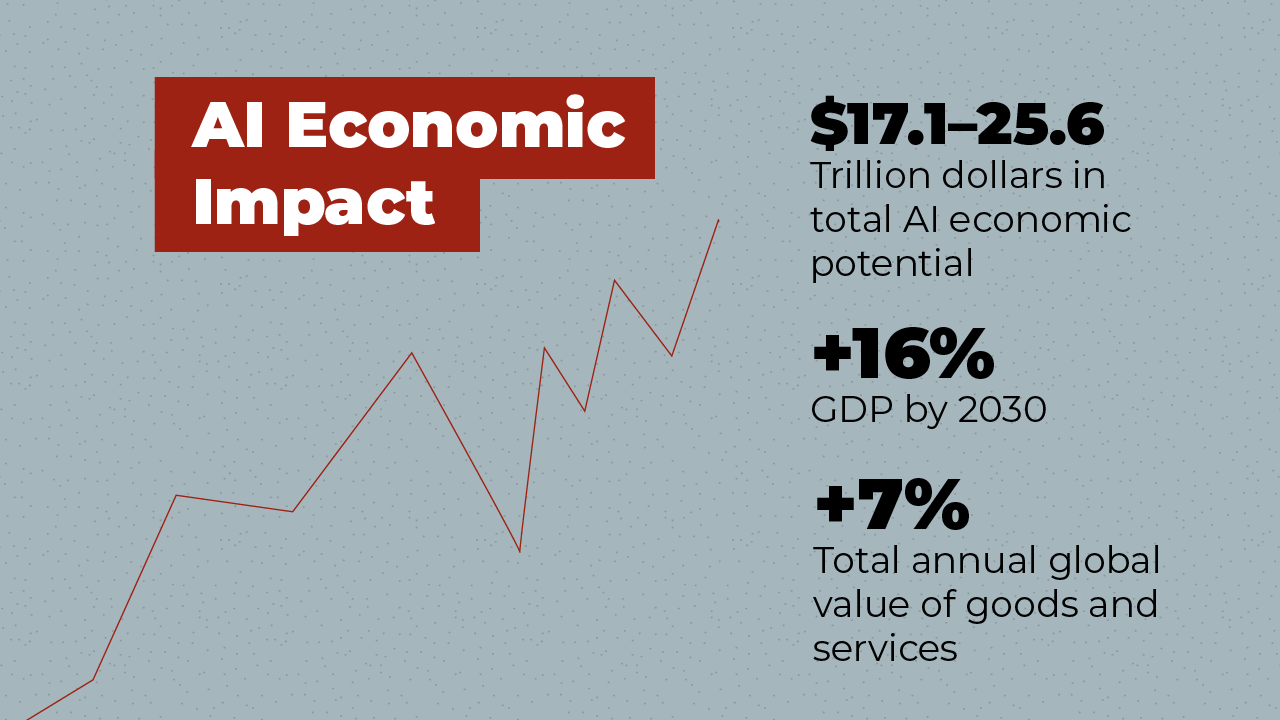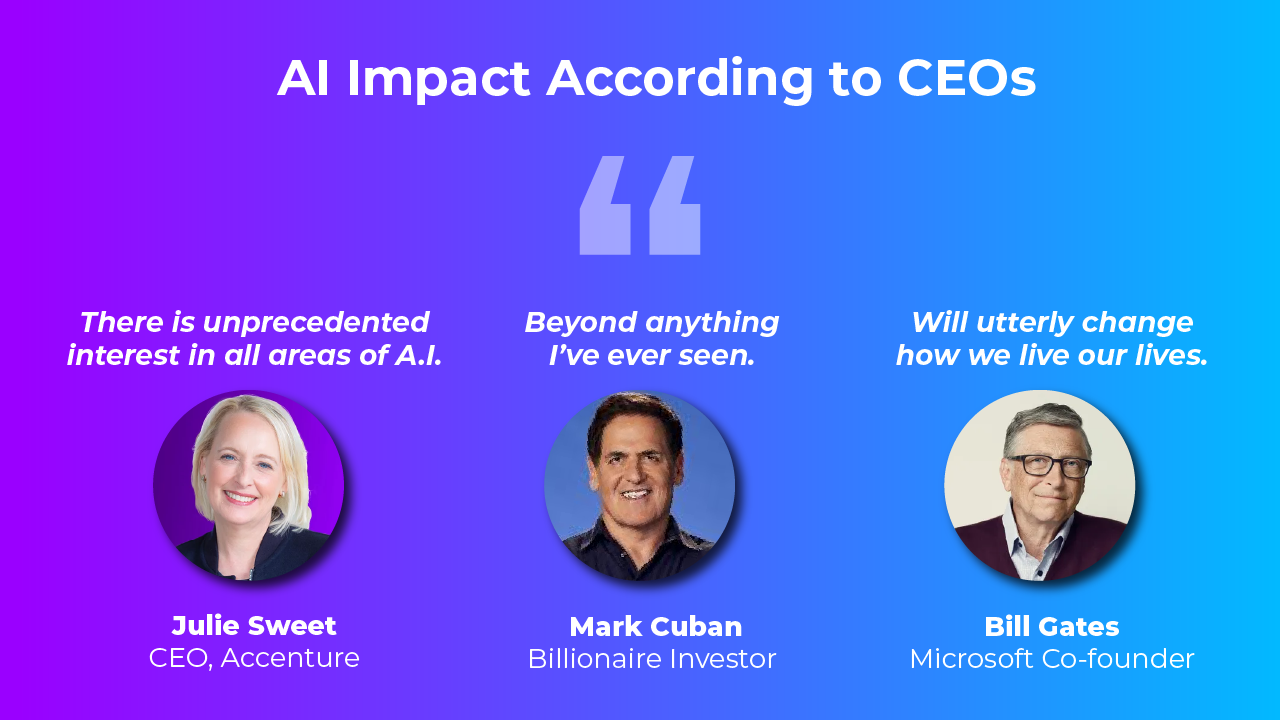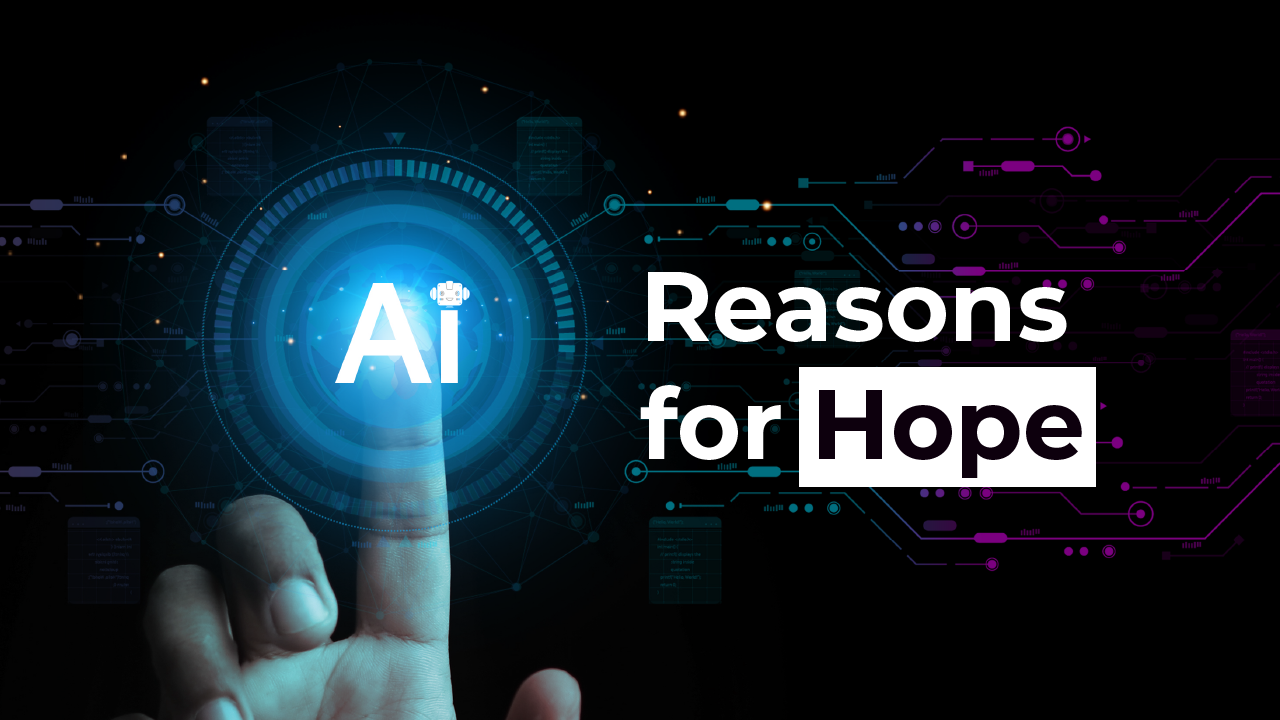Increasingly there seems to be just three positions on the future of AI and work:
- Doom: A 2023 Goldman Sachs prediction that as many as 300 million fulltime jobs would be lost due to AI inflamed the anxieties of many, who see the tech as a potential devastation for workers—potentially leading even to our extinction.
- Giddiness: With McKinsey predicting an added $17 to $25 trillion in value from AI, and ChatGPT logging 180.5 million users (100 million active weekly!), many (especially in big tech and their investors) are ecstatic about AI’s furious adoption and continuous innovation.
- Ignorance: Believe it or not, only 23% of US adults say they have ever used ChatGPT, according to the Pew Research Center (up from 18% in July 2023). 34% say they have heard nothing at all about ChatGPT, showing that a third of Americans remain outside this loop entirely.

But just as the hopes of massive financial windfalls remain largely speculative (aside from big tech stock prices—check out our AI roundup for more), so, too, an apocalypse of AI and job displacement has yet to materialize.
In this week’s PTP Report, we look at these first two viewpoints (doom and hope), aiming to chart a more nuanced look at how AI might change more of our lives, in the near term, and for the better.
The Doomsday Scenarios
From an Adecco Group study that 41% of executives expect to employ less people, to Elon Musk calling AI the “most disruptive force in history,” adding that “there will come a point where no job is needed,” there is a definite sense of unease, as well as some AI fear-mongering, about how gen AI will impact the world’s workforce.
One example, from UK-based Institute for Public Policy Research (IPPR), found that as many as 11% of tasks done by workers were already at risk, and that within 3 to 5 years, this could rise to 59% of work tasks.
This, the study reports, would significantly impact women more than men, and more lower-paid secretarial and administrative positions would be lost. This worst-case outlook could remove 7.9 million jobs in the short term, hampering gains to productivity the tech might trigger.
Note that the study also demonstrates a best-case: an augmentation of the workforce with AI tools, which could boost the UK economy by 4%, or £92 billion per year.
Even beyond job-losses, fears abound about AI exceeding human intellect, being weaponized by bad actors, and making unethical decisions based on flawed training and/or input.
Yann LeCun, Geoffrey Hinton, and Yoshua Bengio won the highly-coveted Turing Award in 2018 for their work together on deep learning, also earning the trio the moniker: the “Godfathers of AI.”
In 2023, two of them: Hinton and Bengio (along with Elon Musk, Steve Wozniak, and more), signed an open-letter calling for all AI labs to immediately pause work, to prevent the training of systems beyond GPT-4.
But one of them, NYU Professor and Meta Chief AI Scientist Yann LeCun, has not.
And he’s not so worried.
Job-Killer vs Work-Booster
Even aside from the significant financial impacts and excitement around potential innovations, like agents, AI-designed drugs, and chatbot entertainment, there may be additional reasons for optimism about AI and jobs: how it may empower workers.
[Check out our PTP Report on AI Agents for more.]
David Autor, MIT labor economist and long-time skeptic of the economic benefits of computing (and the overall automation impact on jobs), recently published a unique take that challenges the view that AI will put lower-skilled people out of work in mass quantities.
In a recent publication about AI and the future of work entitled AI Could Actually Help Rebuild The Middle Class, Autor challenges Elon Musk’s quotes to UK Prime Minister Rishi Sunak about AI ending work, asserting instead that declining birth rates and our current surge in openings suggests we may run out of workers well before we run out of jobs.
AI’s transformation, Autor asserts, will be significant, making some jobs as outdated as typesetters, fur-trappers, and spell-checkers are today, but that doesn’t mean it’s going to suddenly replace us. There will also be new AI job creation, though it will require a workforce adaptation to AI.
Autor views AI as a tool (ala a calculator, washing machine, or chainsaw), which may require new future job skills, but instead of replacing people, could empower even more of us.
As Autor writes:
“AI — used well — can assist with restoring the middle-skill, middle-class heart of the U.S. labor market that has been hollowed out by automation and globalization.”
With computing requiring more formal training, and more apprenticeship, the middle class has been shrunk in a way that AI could reverse, empowering more, less formally-trained workers to do more, with AI and workforce productivity going hand-in-hand.
And he’s not alone.
On AI and employment opportunities, co-director of the Wharton School’s AI program Sonny Tambe told Yahoo’s Daniel Howley: “It might be an existential threat to a very narrow set of jobs just like any technology.”
“Even something much more general purpose like, say, a tractor, has a large impact on a narrow set of jobs,” Tambe said. “For most of us, I think it is actually a really useful tool, but not an existential threat, necessarily.”
One of the so-called Godfathers of AI, Professor Yann LeCun, agrees. Regularly playing foil to doomers on social media, LeCun has given out numerous interviews (see References below), detailing positions in sharp contrast to many prevailing views such as:
- Ardently supporting open-source AI (also signing a letter to US President Biden urging support), which he suggests helps advance AI for everyone, across the globe, and further helps good actors stay ahead of bad actors.
- Despite AI’s vast volume of text training data, it still lacks the intelligence of a common house cat, and has learned less than most 4 years old have overall. [For more on multimodal AIs and how they work, check out this PTP Report.]
- AI actually mitigates misinformation as much as creates it, discussing how, at Facebook, AI systems are now removing as much as 95% of the hate speech posted before it reaches consumers (vs 25% just a few years ago).
LeCun believes AI fears have at times become “preposterously ridiculous,” and told the BBC in an interview that AI is “not going to put a lot of people out of work permanently.”
Instead, he believes, like Autor, that there will be new AI-driven career opportunities. While massively transforming our lives, AI can also bring about “a new renaissance for humanity.”

Conclusion
The fear around AI and workforce transformation is real, and also far from unreasonable.
But the less we anthropomorphize AI—giving it human traits and desires that it lacks, the more we demystify it, apply critical reasoning to its outputs, models, and sources—the less fearful, and dangerous, it becomes.
There will be negatives: layoffs, jobs rendered obsolete, episodes of AI-driven cybercrime causing suffering to many, and more.
But the doom view is no set path— it is up to us to make the right decisions, nurturing the positive impact of AI on employment, empowering more people than all the prior computing innovations combined.
We conclude with quotes from the authors of two of studies profiled in this piece:
- As IPPR senior economist Carsten Jung told the Guardian: “…technology isn’t destiny and a jobs apocalypse is not inevitable – government, employers and unions have the opportunity to make crucial design decisions now that ensure we manage this new technology well.”
- David Autor: “AI offers vast tools for augmenting workers and enhancing work. We must master those tools and make them work for us.”
References
AI could replace equivalent of 300 million jobs – report, BBC
AI will shrink workforces within five years, say company execs, CNN Business
What’s the future of generative AI? An early view in 15 charts, McKinsey
Generative AI Could Raise Global GDP by 7%, Marcus by Goldman Sachs
AI ‘apocalypse’ could take away almost 8m jobs in UK, says report, The Guardian
AI ‘godfather’ Geoffrey Hinton warns of dangers as he quits Google, BBC
Pause Giant AI Experiments: An Open Letter, Future of Life Institute
How Not to Be Stupid About AI, With Yann LeCun, Wired
Meta scientist Yann LeCun says AI won’t destroy jobs forever, BBC
Meta’s AI chief doesn’t think AI super intelligence is coming anytime soon, and is skeptical on quantum computing, CNBC





